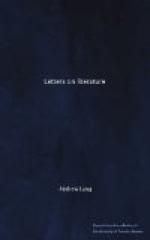DEDICATION
Dear Mr. Way,
After so many letters to people who never existed, may I venture a short one, to a person very real to me, though I have never seen him, and only know him by his many kindnesses? Perhaps you will add another to these by accepting the Dedication of a little work, of a sort experimental in English, and in prose, though Horace—in Latin and in verse—was successful with it long ago?
Very sincerely yours,
A. LANG.
To W. J. Way, Esq. Topeka, Kansas.
PREFACE
These Letters were originally published in the Independent of New York. The idea of writing them occurred to the author after he had produced “Letters to Dead Authors.” That kind of Epistle was open to the objection that nobody would write so frankly to a correspondent about his own work, and yet it seemed that the form of Letters might be attempted again. The Lettres a Emilie sur la Mythologie are a well-known model, but Emilie was not an imaginary correspondent. The persons addressed here, on the other hand, are all people of fancy—the name of Lady Violet Lebas is an invention of Mr. Thackeray’s: gifted Hopkins is the minor poet in Dr. Oliver Wendell Holmes’s “Guardian Angel.” The author’s object has been to discuss a few literary topics with more freedom and personal bias than might be permitted in a graver kind of essay. The Letter on Samuel Richardson is by a lady more frequently the author’s critic than his collaborator.
INTRODUCTORY: OF MODERN ENGLISH POETRY
To Mr. Arthur Wincott, Topeka, Kansas.
Dear Wincott,—You write to me, from your “bright home in the setting sun,” with the flattering information that you have read my poor “Letters to Dead Authors.” You are kind enough to say that you wish I would write some “Letters to Living Authors;” but that, I fear, is out of the question,—for me.
A thoughtful critic in the Spectator has already remarked that the great men of the past would not care for my shadowy epistles—if they could read them. Possibly not; but, like Prior, “I may write till they can spell”—an exercise of which ghosts are probably as incapable as was Matt’s little Mistress of Quality. But Living Authors are very different people, and it would be perilous, as well as impertinent, to direct one’s comments on them literally, in the French phrase, “to their address.” Yet there is no reason why a critic should not adopt the epistolary form.
Our old English essays, the papers in the Tatler and Spectator, were originally nothing but letters. The vehicle permits a touch of personal taste, perhaps of personal prejudice. So I shall write my “Letters on Literature,” of the present and of the past, English, American, ancient, or modern, to you, in your distant Kansas, or to such other correspondents as are kind enough to read these notes.




